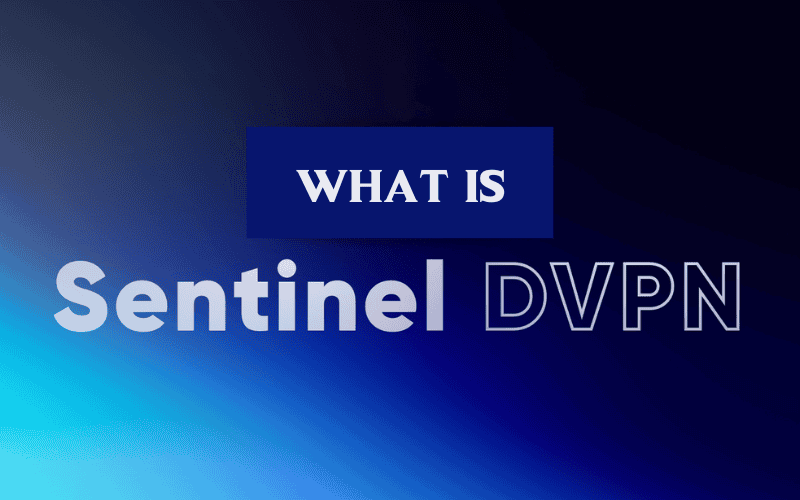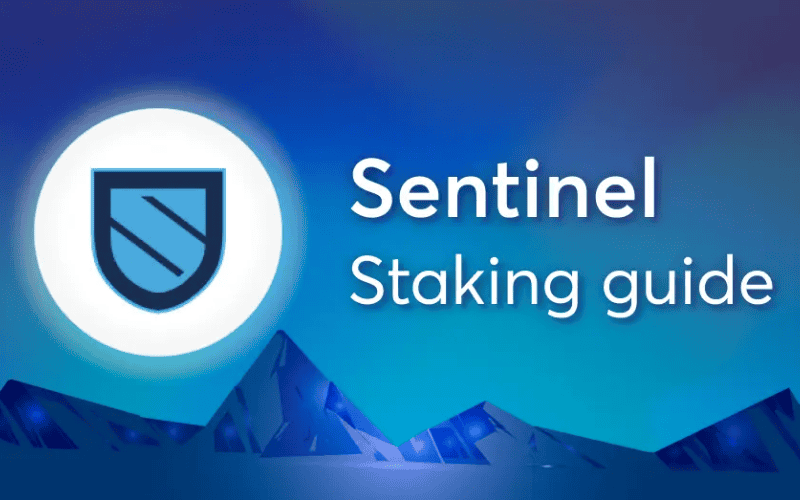Privacy and online safety have become more critical in our increasingly digitized world. The Sentinel decentralized VPN is an emerging solution and a significant step toward enhancing users’ online security and privacy. But what is Sentinel dVPN, and what benefits does it offer? Join us at Proxy Rotating to explore the following article in detail, including how to use the Sentinel decentralized VPN effectively.
What is Sentinel dVPN?
Sentinel dVPN (decentralized Virtual Private Network) is a technological innovation within the Sentinel ecosystem. It leverages blockchain technology to offer a new online privacy and security approach. Unlike traditional VPN services that rely on centralized servers controlled by a single organization, Sentinel dVPN operates on a decentralized network. This network consists of nodes provided by various individuals or entities distributed globally.
The decentralized nature of Sentinel dVPN means it doesn’t have a central point of control or failure, fundamentally changing how data is routed and secured over the internet. In a conventional VPN setup, all user data is routed through the VPN service provider’s servers, creating a potential risk if the provider logs user activity or the servers are compromised. In contrast, Sentinel dVPN routes internet traffic across a distributed array of nodes, reducing reliance on any single entity and dispersing the points through which data travels.
Blockchain technology makes This architecture possible, facilitating the secure, anonymous, and verifiable transactions necessary for operating a decentralized VPN. Blockchain’s immutable ledger ensures that the operations of the dVPN are transparent and accountable, with no single entity able to alter logged data unilaterally.
Furthermore, Sentinel dVPN utilizes a tokenized system as part of its operation, employing cryptocurrencies or digital tokens to facilitate transactions within the network. This includes compensating node providers for their services and allowing users to pay for VPN services. Using blockchain and tokens also introduces a layer of economic incentive, encouraging the growth and sustainability of the network by rewarding participants.
Overall, the Sentinel dVPN represents a shift towards a more decentralized internet security and privacy model, aiming to address some of the vulnerabilities and trust issues associated with traditional, centralized VPN services.

How does the Sentinel network function?
The Sentinel Network is a decentralized, blockchain-based node marketplace where anyone can buy and sell bandwidth, enabling multiple VPN providers to access its network. This network offers enhanced privacy and security through a more diversified, robust, and competitive framework than traditional VPN applications and bandwidth providers.
Key Components
- Decentralized Bandwidth: The Sentinel Network provides decentralized bandwidth for its VPN services, ensuring a resilient and distributed network that resists censorship and promotes secure, community-driven internet access.
- Node Marketplace: The network operates on a node marketplace where individuals can host dVPN nodes that support either the Wireguard or the V2Ray protocol. These nodes are incentivized with rewards like $DVPN tokens and ensure a robust network.
- Blockchain Technology: The Sentinel back-end is a permissionless blockchain that records bandwidth usage and currency transfers between nodes, providing transparent and trustless operations.
- Community-Driven Economic Model: The network operates on a community-driven economic model where users can earn passive income by running a node or buying a router and selling unused bandwidth to the Sentinel network.
- Whitelabel VPN Applications: Users can build their own white-label VPN applications on top of Sentinel, which are more secure and trustworthy than traditional centralized VPNs

What features does Sentinel DVPN offer?
Sentinel dVPN offers several key features that enhance privacy, security, and accessibility for users:
- Decentralized Network: Sentinel operates on a decentralized network of nodes hosted anonymously and independently by individual node hosts, making it challenging to identify and block these nodes.
- Customizable Subscription Plans: The dVPN application allows users to choose from various subscription plans that can be customized by the application builder. These plans determine the nodes users can access, the data they can use, and the monthly cost.
- Multiple VPN Protocols: Sentinel nodes offer users a choice between the best VPN routing protocols, WireGuard and V2Ray, to provide optimal VPN connectivity.
- Fiat and Crypto On-Ramps: Sentinel dVPN applications come built-in with fiat on-ramps and crypto payment gateways, allowing users to pay in various currencies.
- Passive Income Opportunities: Users can earn passive income by running a node or buying a router and selling their unused bandwidth to the Sentinel network.
- Open-Source and Community-Driven: Sentinel dVPN applications are open-source, allowing continuous community improvement and transparency.
- Whitelabel VPN Applications: Anyone can build a dVPN application on top of Sentinel that is more secure and trustworthy than any centralized VPN.
- Enhanced Privacy and Security: Sentinel dVPN offers enhanced privacy and anonymity, resilience against censorship, transparent and trustless blockchain technology operations, and a community-driven economic model.
These features make Sentinel dVPN a compelling choice for users seeking a secure, private, and accessible VPN solution that aligns with the principles of decentralization and community-driven development.

Benefits of Sentinel decentralized VPN
The Sentinel decentralized VPN offers benefits to enhance online security, privacy, and user experience. Here’s a closer look at each of these advantages:
High security and privacy
Sentinel dVPN leverages the inherent security features of blockchain technology, ensuring that user data is encrypted and distributed across a network of nodes. This decentralization makes it significantly more difficult for hackers to compromise user data or any entity to track user activity, providing higher security and privacy than traditional VPNs.
Anonymous internet access
By routing traffic through various nodes around the globe, Sentinel dVPN allows users to access the internet without revealing their IP address. This anonymity protects users from being tracked by websites, ISPs, and third parties, enhancing privacy and safeguarding personal information from potential misuse.
Circumventing geographic limitations
One of the hallmark features of any VPN is its ability to circumvent geo-restrictions, and Sentinel decentralized VPN is no exception. Users can access content that may be restricted in their country by connecting to nodes in locations where the content is available, thus bypassing censorship and regional content blocks.
High-speed connections
The distributed nature of Sentinel decentralized VPN means that users can often find nodes close to their location, minimizing latency and offering better speeds than centralized VPN services that may suffer from congestion at popular server locations. This network efficiency ensures smooth streaming, gaming, and browsing experiences for users.
Affordable pricing
Operating on a decentralized network can reduce operational costs for the Sentinel decentralized VPN service, as it relies on a distributed network of nodes rather than maintaining expensive server infrastructure. These savings can be passed on to users, offering competitive and affordable pricing for high-quality VPN services.
Together, these benefits demonstrate how Sentinel decentralized VPN stands out in the crowded VPN market by providing a secure, private, and user-friendly online experience. Its innovative use of blockchain technology to achieve decentralization not only enhances performance and accessibility but also sets a new standard in the quest for digital privacy and freedom.

Comparing Sentinel decentralized VPN with traditional VPN services
Comparing Sentinel decentralized VPN (dVPN) with traditional VPN services illuminates the contrasts in their foundational technology, operational model, and the benefits they deliver. Here’s a detailed analysis of the pros and cons of Sentinel dVPN about traditional VPN services:
| Sentinel dVPN | Traditional VPN services | |
| Pros | Enhanced privacy and security
Improved trust and transparency
Resistance to censorship
Incentivized participation
|
Simplicity and ease of use
Consistent performance
|
| Cons | Complexity and usability
Adoption and network effect
|
Privacy and security concerns
Vulnerability to censorship and blocking
|
In summary, Sentinel decentralized VPN offers a forward-thinking approach to online privacy and security, capitalizing on the benefits of decentralization and blockchain technology. However, its adoption and user experience may present challenges compared to traditional VPN services, which are generally more user-friendly but have inherent privacy and security trade-offs due to their centralized nature.
What sets Sentinel apart in the VPN market?
Sentinel stands out in the VPN market due to its decentralized peer-to-peer (P2P) architecture, which offers several unique features and benefits compared to traditional VPN services:
- Decentralized Network: Sentinel’s decentralized network does not rely on a central server. This makes it more secure and resistant to government surveillance and hacking.
- Peer-to-Peer Bandwidth Sharing: Users can share their unused internet bandwidth with others in the network, creating a community-driven and cost-effective VPN service. The Sentinel Token ($SENT) facilitates this, and nodes are compensated for their bandwidth contributions.
- Smart Contracts for Bandwidth Measurement: Sentinel uses intelligent contracts to accurately measure internet usage and sharing, ensuring users are charged only for their bandwidth. This is a novel application of blockchain technology in the VPN space.
- Distributed Exit Nodes: The network has a robust relay network with distributed exit nodes, making it difficult for ISPs or governments to monitor and identify users. This enhances user privacy and security.
- Integration with Additional Services: Sentinel offers decentralized services, including chat, VoIP, and DNS, which can be used with the VPN service. This provides a comprehensive suite of privacy and security tools.
- Hardware Device for Secure Internet: Sentinel is developing a hardware device that can be connected to a router to encrypt all data flowing through it. This device aims to provide a secure and private internet connection for all devices connected to the router.
- Open-Source and Transparent: Sentinel’s protocol is open-source, ensuring transparency and community involvement in the network’s development and maintenance.
These features and the decentralized architecture set Sentinel apart from traditional VPN services, making it an attractive option for those seeking enhanced privacy and security.

Guide to using Sentinel dVPN.
Using Sentinel decentralized VPN involves a few straightforward steps, from installation to making the most of its features. Here’s a general guide on how to get started with Sentinel decentralized VPN:
How to install Sentinel decentralized VPN?
- Download the app: Visit the official Sentinel website or the app store on your device to download the SSentinel decentralized VPN application. Ensure you’re downloading from a reliable source to avoid any counterfeit software.
- Installation: Open the downloaded file and follow the installation instructions. On mobile devices, this process is typically handled automatically after download.
- Create an account: Some versions may require creating an account or wallet, mainly since Sentinel decentralized VPN may utilize a token-based system for services. Follow the app’s guidance to set up your account securely.
How do you connect with Sentinel decentralized VPN?
- Open Sentinel decentralized VPN: Launch the app on your device. You should sign in or set up a new account if this is your first use.
- Select a node: You can choose from a list of nodes (servers) based on location, speed, or other criteria. Various users around the world provide these nodes.
- Connect: Once you’ve selected a node, press the connect button. The app will establish a VPN tunnel to route your internet connection through the chosen node, encrypting your data.
How do you use the features of Sentinel decentralized VPN?
- Browsing anonymously: With the VPN connection active, your online activity is encrypted, masking your IP address and allowing you to surf the web anonymously.
- Accessing Geo-restricted content: Choose nodes where the content you wish to access is available. This feature is handy for bypassing censorship or accessing region-specific streaming content.
- Managing connections: The Sentinel decentralized VPN app allows you to easily manage your VPN connections, switch between nodes, or disconnect from the VPN as needed.
- Using Sentinel decentralized VPN tokens: If the service requires payment, you may need to use Sentinel’s dVPN tokens or another cryptocurrency. Ensure you understand how to acquire, store, and use these tokens securely.
- Adjusting settings: Explore the app’s settings to optimize your VPN experience. This can include adjusting security levels, setting up a kill switch (disconnecting from the internet if the VPN connection drops automatically), or customizing other preferences.
- Support and troubleshooting: If you encounter issues, the Sentinel community and official documentation can be invaluable resources for support and troubleshooting tips.
Remember, the exact steps and features may vary depending on the version of the Sentinel decentralized VPN app you use and the specific device. Always refer to the latest official guides and documentation provided by Sentinel for the most accurate and detailed instructions.
FAQ about Sentinel decentralized VPN
- Is Sentinel decentralized VPN safe?
Yes, Sentinel dVPN is designed to be safe. It leverages the principles of decentralization and blockchain technology, which inherently enhance security and privacy. By distributing data across numerous nodes rather than relying on centralized servers, Sentinel dVPN minimizes the risks of data breaches and surveillance. Moreover, blockchain ensures that transactions within the network are secure, transparent, and tamper-proof. However, like with any technology, safety depends on the user’s practices, such as securely managing access credentials and staying informed about digital security.
- Is Sentinel decentralized VPN free?
Sentinel dVPN offers a freemium model. This means that users can access certain services for free, but there might be limitations on usage, speed, or available features. Users may need to pay for full access to all features and higher performance, typically using the platform’s native cryptocurrency or tokens. The exact details can vary, so checking the current offerings on Sentinel’s official website or app for the most up-to-date information is best.
- Does Sentinel decentralized VPN work in my country?
Sentinel dVPN is designed to work globally, utilizing a decentralized network of nodes provided by users worldwide. This global network structure aims to ensure that the service can be accessed from virtually any country. However, the effectiveness and legality of VPN usage can vary by location due to local laws and internet regulations. It’s essential to check the legal status of VPNs in your country and understand any potential restrictions or risks.
- What can I use Sentinel decentralized VPN for?
Sentinel dVPN can be used for a variety of purposes, similar to other VPN services, but with the added benefits of decentralization:
- Enhancing online privacy and security: Encrypting your internet connection to protect personal information from hackers, ISPs, and surveillance.
- Bypassing censorship and Geo-restrictions means accessing websites, content, and services that may be blocked or restricted in your location.
- Safe and anonymous Browsing: Keep your online activities private without revealing your IP address.
- Secure communication: Ensuring that your communications, whether for work or personal purposes, are encrypted and safe.
- Accessing secure remote networks: Safely connecting to business or home networks while traveling.
Given its decentralized nature, Sentinel dVPN offers these functionalities with potentially greater security and privacy compared to traditional VPN services, making it a compelling choice for users concerned with maintaining their digital freedom and security.
Sentinel decentralized VPN is an excellent choice for those wanting to protect their online privacy and security. Sentinel dVPN offers numerous features and benefits that surpass traditional VPN services. Therefore, the Sentinel decentralized VPN is an intelligent solution for all users. If you are interested in related content, please visit the website https://proxyrotating.com to discover more.
>> See more:
Deeper connect mini decentralized vpn firewall hardware
